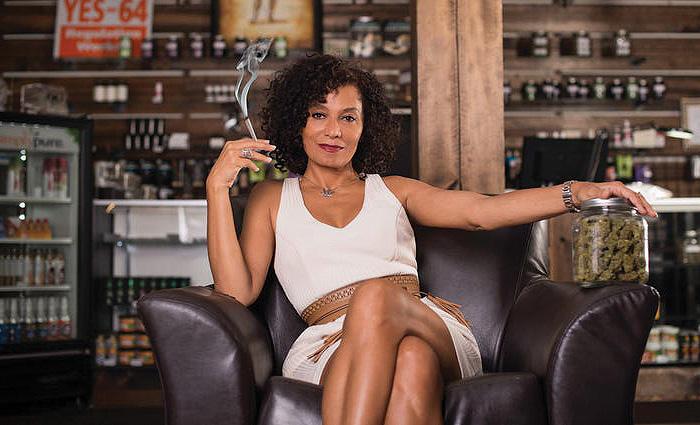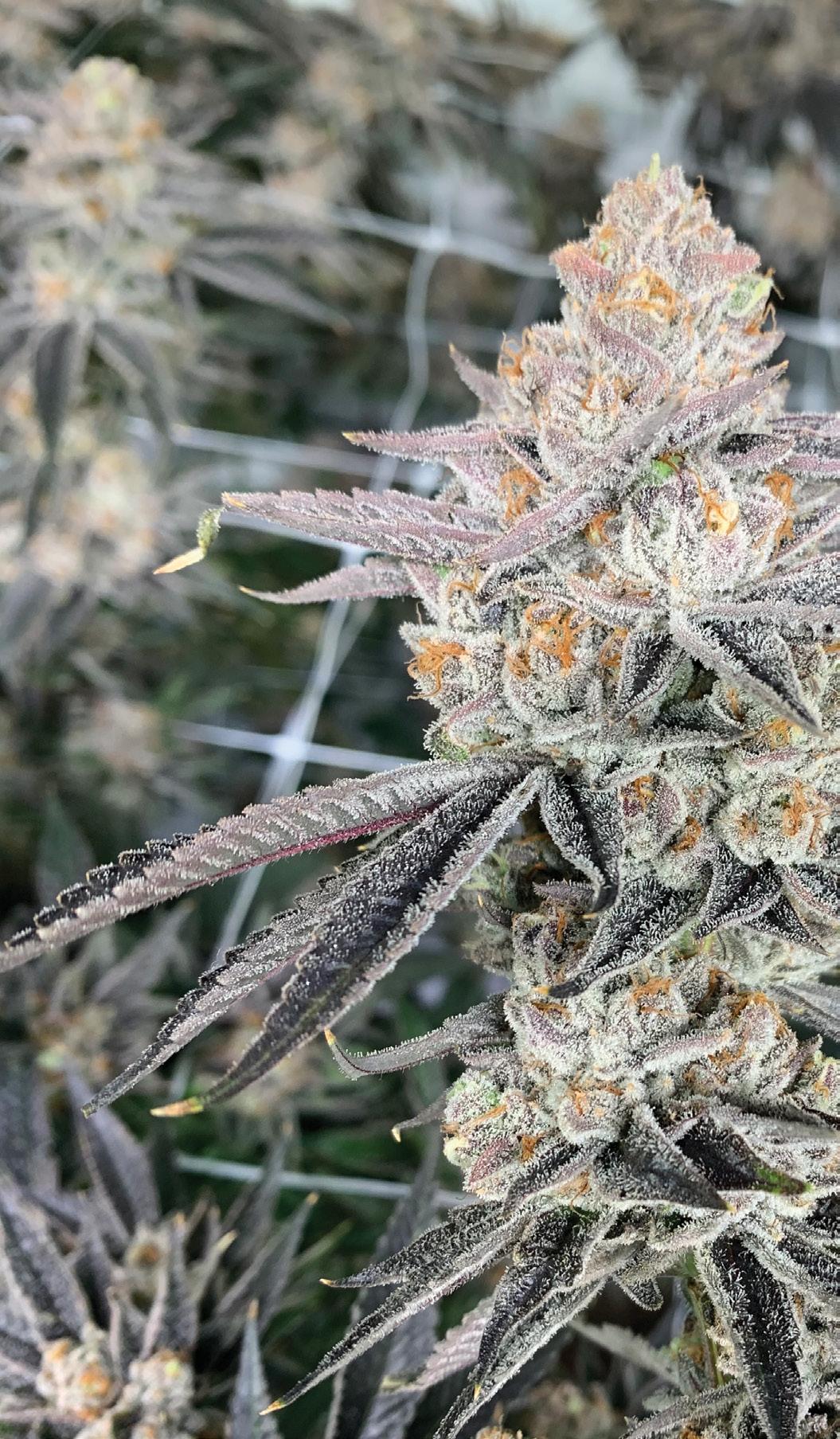
13 minute read
BALL FAMILY FARMS
from Aug. 2020 — Maryland Leaf
by Northwest Leaf / Oregon Leaf / Alaska Leaf / Maryland Leaf / California Leaf / Northeast Leaf
From hustling ounces,
sitting in prison facing 10 years of federal time, to legal Cannabis business ownership in the most competitive market in the country - Chris Ball’s love affair with the plant spans decades.
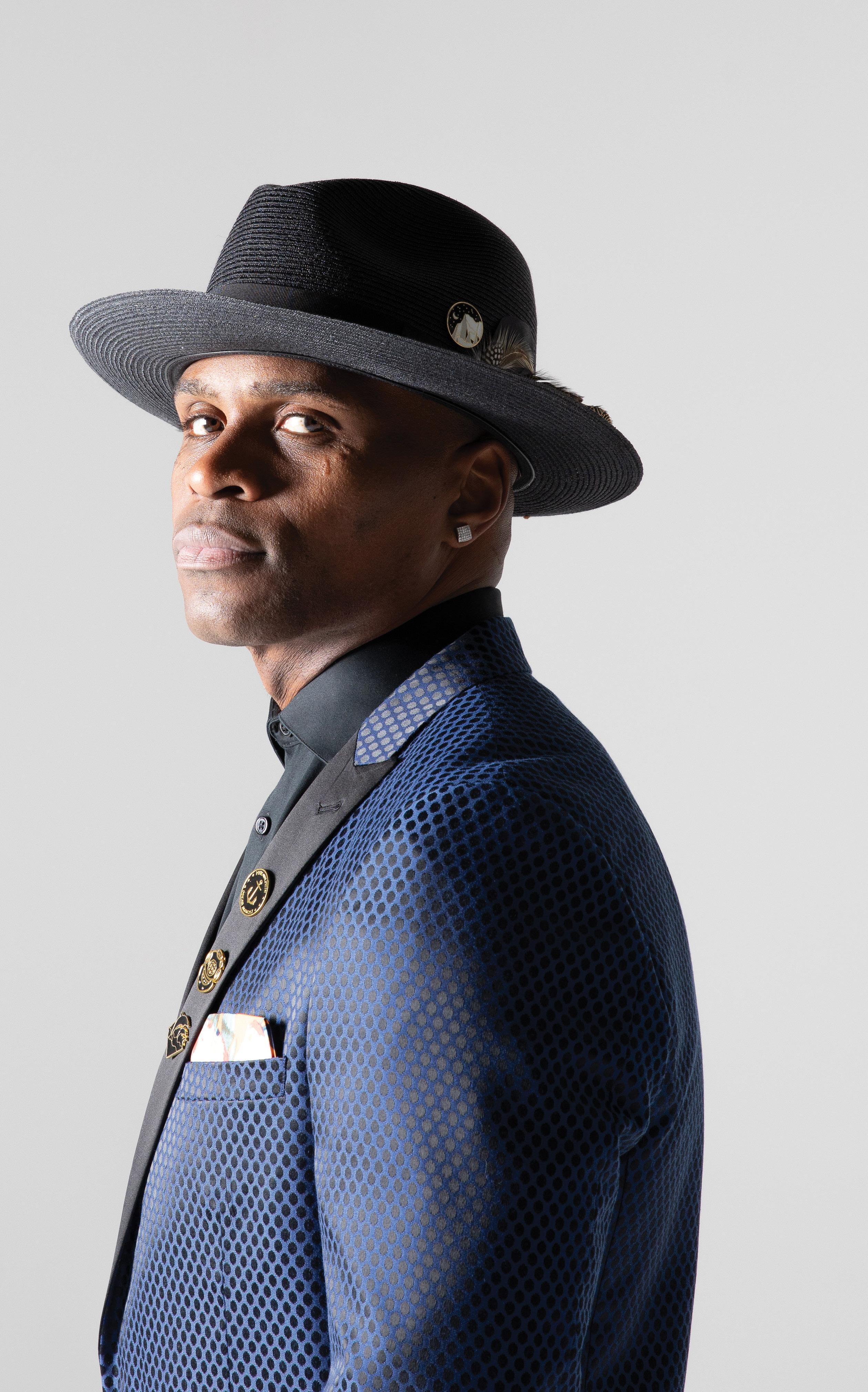
THE EARLY YEARS
Chris Ball grew up with a pretty normal childhood in South Central Los Angeles, in the quiet suburb of Row- land Heights. At the young age of only eight-years-old, Ball had his first exposure to Cannabis - even though he wasn’t aware of what it was at the time. He began to notice that his father would retire to the couch after dinner, grab a rolling tray and twist up and enjoy a funny smelling cigarette, while his mother would relax with a glass of wine.
He would smell the same funny smelling cigarettes and watch his uncles, cousins and even grandmother enjoy them at family functions.
As he got older, he came to understand what the substance was, but was left perplexed by the seemingly opposite paradigms that were being presented to him. On one hand, the Reagan administration was pushing the “Just Say No” campaign, spreading the message that drugs, including Cannabis, were bad for you and to reject experimenting with any and all substances. On the other hand, his real world experience showed him that was not the case at all.
The Ball Family would always score their herb from Chris’ cousin Earl and eventually, Ball connected the dots and the foundations of his enthusiasm for Can- nabis business began to take shape. His cousin Earl always had the newest sneakers, the freshest fits and a nice car - and Ball realized this was a result of him selling weed. He got his first ounce from his cousin at 16 and got to work learning how to sell Cannabis.
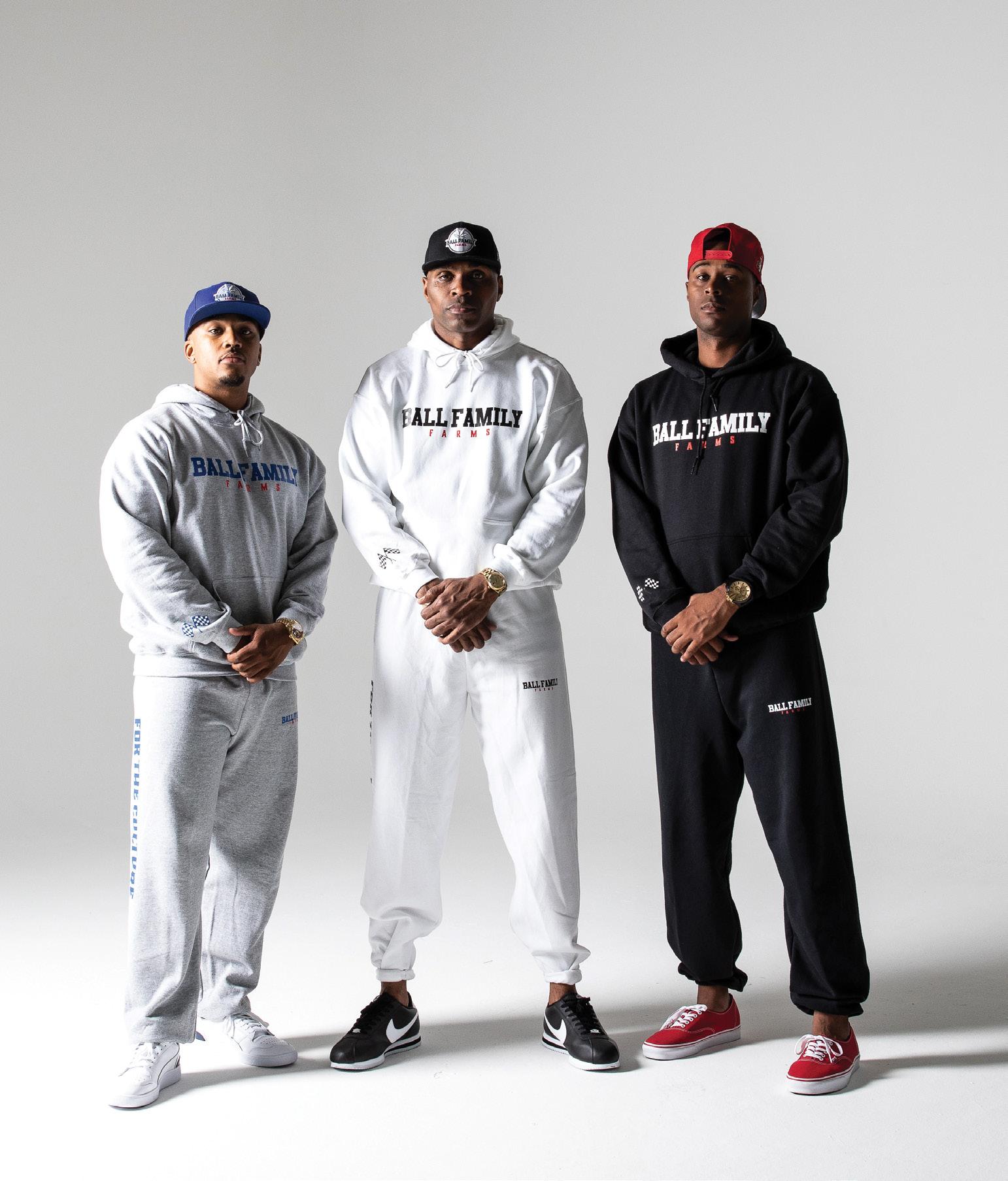
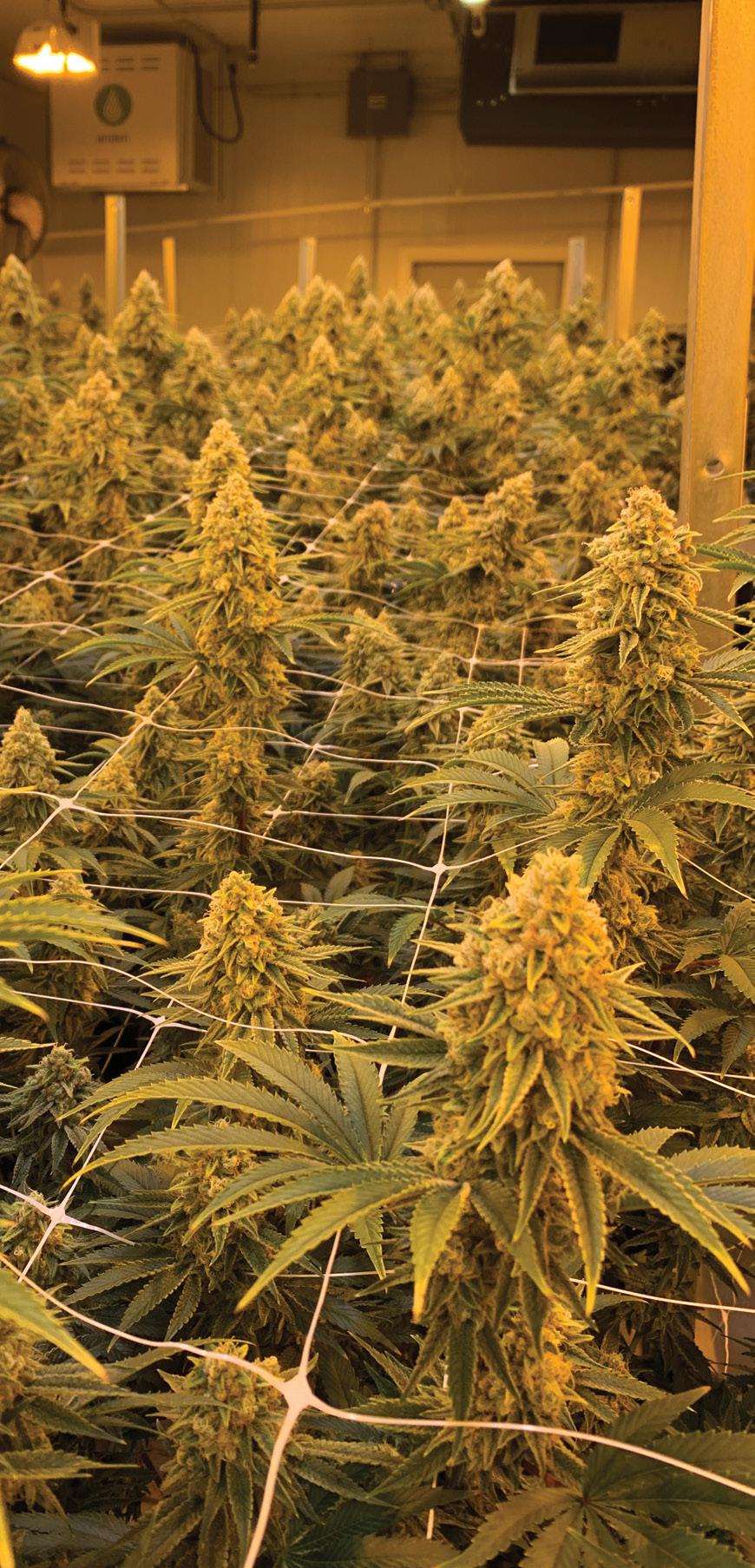
Dabbling in the weed game was fun and mildly lucrative for him, but Ball had big dreams and his innate athleticism drove him to pursue a professional football career. He used the profits from selling weed to fund his basic needs and schooling at Mt. San Antonio Community College, where he was able to earn a full ride scholarship to UC Berkeley to play football.
A GROWING PASSION FOR THE PLANT
Once at UC Berkeley, he stopped hustling weed on the side as it was no longer a necessity.
The scholarship provided the support he needed to focus on going pro and Ball’s sights were set on the NFL. After he graduated, he was recruited to join training camp with the 49ers but was cut before making the final roster.
Instead, he caught the attention of some CFL scouts and wound up landing a contract to play professionally in Canada. It was there that Ball would be bitten by the cultivation bug.
“Before then, I was just a middle man, you know? I just got weed and then I sold it and made a couple extra bucks,” he recalls.
Chris’ best friend on the team’s girlfriend had a brother who was a grower in Vancouver, and the three made several visits to go and gawk at his garden. Once Ball discovered the per pound cultivation cost, he knew instantly there were amazing margins to work with if he could buy in Canada and sell in Los Angeles.
It turns out being from Los Angeles and working for the Canadian Football League would provide the perfect cover for Ball to transport product from Vancouver to Southern California without raising any red flags. Establishing this route in 2003 or 2004, he gained popularity in the LA scene quickly because he could undercut the rest of the market’s prices - thanks to the enhanced margins he was working with.
For over five years, Ball ran Canadian packs down the West Coast to LA. Here he was building a name for himself in the scene, as well as a substantial network, all while gaining boots-on-the-ground experience and learning invaluable lessons. What began as a means to simply provide for himself and support his passion for football had ultimately altered his life path in a major way, becoming his new passion.
HITTING THE FAN
Then, suddenly everything came to a screeching halt in 2010 when Ball was arrested and indicted on federal racketeering charges. The move came shortly after Ball began working with a new business partner who, as it turns out, was being watched by the feds. In the long run, Ball would find out that this business partner was working for El Chapo. Yes, that El Chapo. About six months after meeting this new business partner, the authorities swooped in and arrested Ball, charging him and 13 others with violating the RICO act. Chris was looking at up to 10 years of prison time.
Fortunately, Ball was able to afford a good attorney who was able to get him an accurate idea of what they had against him.
With it being his first offense and the minimal amount of evidence they had against him personally in the case, Ball and his lawyer worked a plea bargain for 30 months for admitting to his part in the illegal trafficking activity.
His lawyer also worked to get him bail and won an appeal to keep Ball from having to serve his 30 month sentence until the trial was over.
The other defendants would fight their cases and trials, lasting about four years before coming to a close. During this time, Ball lived life on the upand-up and kept his nose clean, working corporate retail jobs and paying his taxes.
As the case wrapped up and it was time for Ball to face sentencing for his 30 month bid, his lawyer came to bat for him yet again and argued that the main target of the investigation and indictment was handed a five year sentence. Whereas Ball, a first time offender, was handed nearly three years and for the last four years had been a gainfully employed, tax paying and law abiding citizen. The judge gave Ball ‘time served’ and in 2014 he walked out of the courtroom a free man. >> Continues pg. 34
ball family farms
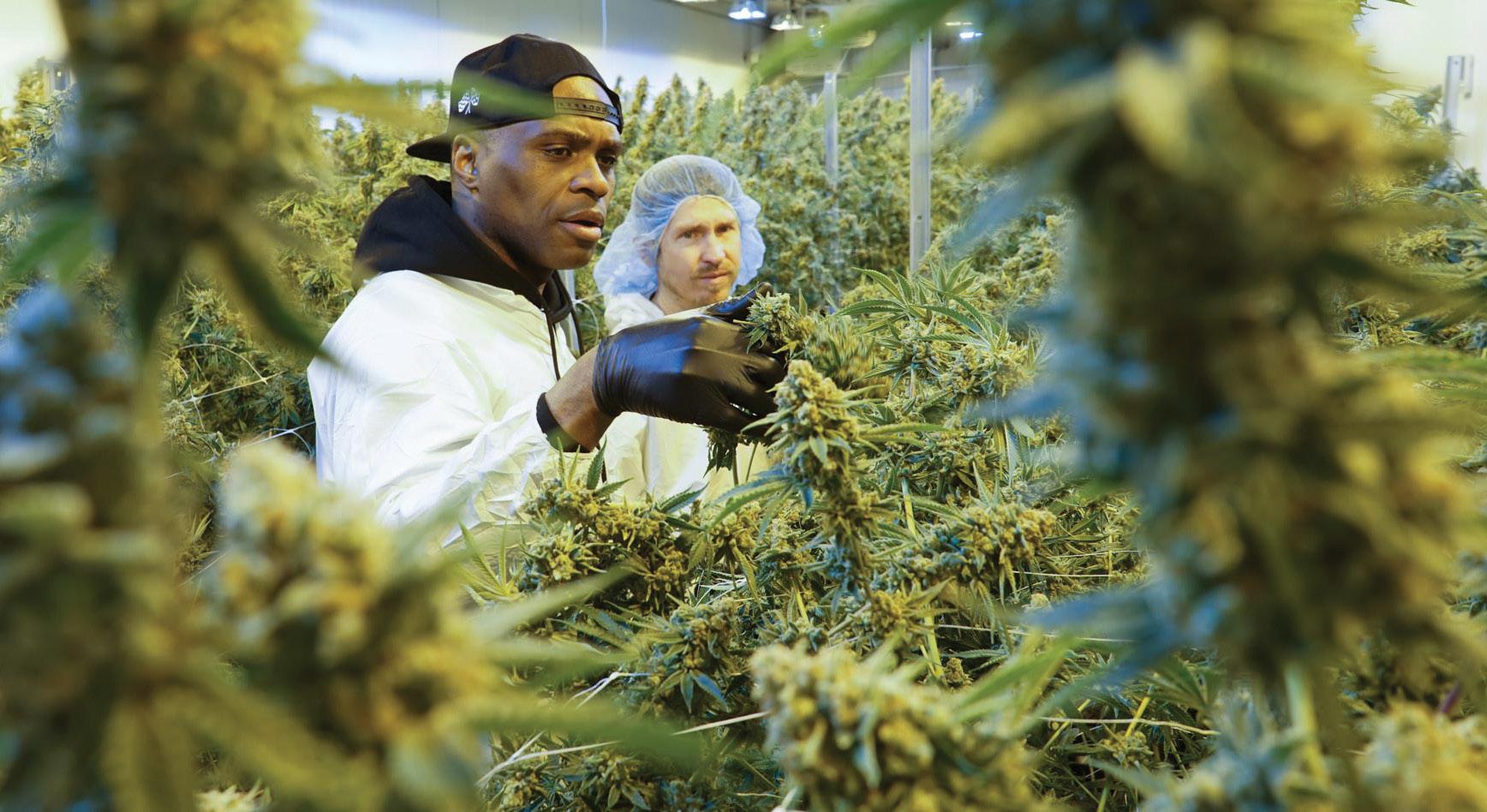
>> Continued from pg. 33
BACK ON THE HORSE
There is no doubt that Ball has a deep passion production. By 2017, Ball had gotten wind of for the plant. Within a matter of weeks of narrowLos Angeles’ equity program and realized he ly avoiding a multi-year prison sentence stemqualified. ming from his involvement “pushing the pack,” In January of 2018, California legalized he was filling a 14 light grow room with plants Cannabis and by December of that same and flipping on the lights to take his first shot at year, Ball received an Adult-Use production growing Cannabis himself. license from the state.
Shortly after the trial was finished, Ball went to collect on an owed debt from a former business GROWING PAINS OF A NASCENT INDUSTRY associate. He ended up accepting the grow in Despite Ball’s good fortune to learn of Los place of the money that was owed to him and it Angeles’ equity program early on and obtain was off to the races. Granted, it wasn’t without licensure in the first year of California’s recredealing with growing’s steep learning curve that ational legality, he had no qualms vocalizing he was able to produce anything of value with his disappointment with the way the system the grow. “I burnt up currently functions. “I plants for a good two years not knowing what WITHIN A MATTER OF WEEKS won’t lie to you,” he says when asked about how I was doing,” he exOF NARROWLY AVOIDING the program helped him plained. “But the more you grow, the more you learn, the more people A MULTI-YEAR PRISON SENTENCE STEMMING FROM with the process. “They granted me the license and then that was it. It you ask for help. And HIS INVOLVEMENT “PUSHING would be the equivalent you meet people - I met a couple cool cats that were willing to come in THE PACK,” CHRIS BALL WAS FILLING A 14 LIGHT GROW of you getting a football scholarship and then they don’t pay for your and split some equity ROOM WITH PLANTS AND housing, they give you with me and teach me the ropes.” In the same year his FLIPPING ON THE LIGHTS TO TAKE HIS FIRST SHOT AT no money for books, they give you no money for food, they give you trial was finished - and GROWING CANNABIS HIMSELF. no tutors - they just say despite crystal clear you can come to the warnings by the judge school.” that any Cannabis related conviction would have From Ball’s perspective, the system may Ball going straight to jail - he had new partners lower the barrier of entry for applicants to and was taking steps towards vertically integratenter the industry, but it does nothing to ing his business with his new cultivation facility. support newly licensed operators who are From 2015 to 2016, he refined his cultivation forced to overcome a nightmarishly steep skills and really learned the ins and outs of learning curve to stay in business. Had Ball not had years of experience in growing and a substantial network from his prior distribution efforts - learning the tough lessons that come along with being successful in the illicit BALLFAMILYFARMS.COM | @BALLFAMILYFARMS Cannabis market during that time - he would have never made it into the legal market with

a legitimate, licensed and state recognized business.
“There needs to be some money, and some help and some consulting behind the scholarship of the license,” says Ball.
Despite an incredibly thorough 75+ page report analyzing potential barriers that may prevent social equity applicants from equitable access to the legal Cannabis industry - along with opportunities to overcome these barriers commissioned by Los Angeles before California legalized in 2018 and having received over $7.8 million in funding since October of 2019 - complicated issues remain. Here, Ball’s real world experience and the overall lack of diversity in the space indicate the need for further investment into the development of the structure of the industry’s equity programs not just in Los Angeles, but across California.





Where Do Women Fit in the Cannabis Industry?

WE’VE ALL READ THE ARTICLES AND LISTENED TO PODCASTS ABOUT THE UPHILL BATTLES WOMEN FACE IN THE CANNABIS ARENA, RANGING EVERYWHERE FROM INVESTMENTS AND OWNERSHIP TO SEXUAL HARASSMENT.
I could give you data from a 2020 UCLA study about how women working in dispensaries report significantly greater levels of sexual harassment and unwanted sexual attention than men. Or we could talk about how multiple studies confirm a correlation between traditional masculine gender norms and increased Cannabis use. However, none of the data or anecdotes will change the minds of some. Many people think they understand sexism in Cannabis as just that - regular sexism - without diving into the history behind it.
To really get an understanding of how the Cannabis industry got to this point, we need to go back to the illicit black market days, before legalization. With the trap came the risks, especially for women. Women were typically kept away from positions of ownership or authority since most of the underground game was tough and masculine, both as a culture and as a means of actual physical security. Because of this, women involved in the illicit Cannabis markets were either drug mules or, more commonly, intimately involved with someone along the supply chain.
Now that the industry has shifted into the light, a lot of the same key players remain on top - breeders, cultivators, suppliers, you name it. A lot of those staple figures are heterosexual men that spent a long time in the same market honing their craft and waiting for legalization. An inherent problem with that, however, is that a lot of the same attitudes and ideas shifted to the legal market at the same time. And why wouldn’t they if they worked so well underground? The reason a variety of these issues remain the same is because the culture never changed from the underground to the legal market.
At the same time, white collar investment companies and large overseas firms began to sink their teeth into the Cannabis space. There’s no need to dive into sexism and discrimination in corporate companies because it’s already well researched and discussed, but the need to highlight its presence in Cannabis is important.
Between the two ultra-masculine powerhouses of the illicit and corporate worlds, women have been historically held back from real engagement and involvement. Now that we’ve taken a look at how men have
“W O M E N S H O U L D B E P R I M A R I LY R E S P E CT E D F O R T H E I R K N O W L E D G E O N C U LT I VAT I O N , G E N E T I C S , R E TA I L M A N AG E M E N T A N D B U S I N E S S I N V E S T M E N T S - N OT J U S T H O W P R E T T Y T H E Y LO O K SMOKING WEED ON INSTAGRAM.”
influenced Cannabis, it’s time to shift toward the other end of the spectrum: the perpetuation of sexist stereotypes by other women.
There’s been a push over the years to make space for women by showcasing stereotypical traits - like vibrant pink colors, manicures, jewelry and other traditional behaviors.
When looking at ‘normal’ events that aren’t geared to any gender (which is debatable), Cannabis is the focus with top-shelf flower, high quality hash, heady glass and equipment dominating discussions. At women-forward events, there seems to be a focus on femininity and aesthetics more than the Cannabis, or the real ways in which women are involved with it.
CBD products are heavily marketed toward women at these events, like eye creams and moisturizers, in lieu of cannagars or specialty blunts that are featured at several other non-gendered events. Commonly, women are marketed to by companies and other women by using femininity to sell products instead of actual quality.
Being feminine is not inherently bad and does a lot of meaningful good by proving that anyone can be ‘girly’ and consume Cannabis. Women should be primarily respected for their knowledge on cultivation, genetics, retail management and business investments - not just how pretty they look smoking weed on Instagram.
Between the underground market players becoming legitimate, the corporate world wedging itself at the top of major chain networks, and companies playing off traditional gender norms, women are fighting obstacles at multiple angles. Old school players from the black market need to realize their roles in perpetuating harmful stereotypes of sexualizing women or by keeping the top positions a ‘boys club’ only.
Corporate Cannabis needs to understand that women are more than just pretty faces to greet customers to boost sales, and deserve the same pay as their male coworkers for the same work.
Women need to understand that women also love quality products and not just stereotypically traditional services and events - we’re more than eye creams and jewelry. Sexism will never be completely eradicated from the field, but the best we can do is try to understand it and learn from it, progressing toward a better future in Cannabis.
#MARYLANDLEAF
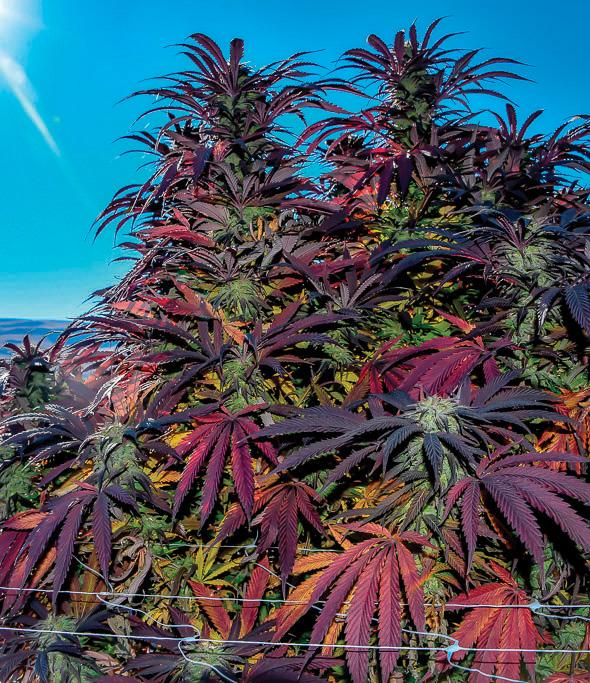


Affordable Advertising Available
@MARYLANDLEAF email Wyatt@LeafNationMD.com for details on including your brand & company MDLEAF in the Sept./Oct./Nov. 2020 Maryland Leaf!




